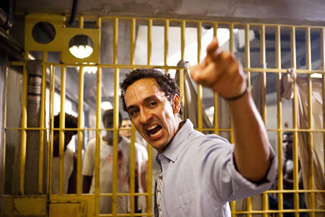|
|
Viking Night: Elite Squad 2By Bruce HallMarch 27, 2012
Without a doubt, Elite Squad 2 is full of enough twists, turns and narrative intrigue for two or three films. On top of that, it offers up generous helpings of car chases, gunplay, Brazilian girls in bikinis, torture, screaming matches, blood, sweat and tears. But none of it feels forced, contrived or gratuitous. There's plenty of shocking violence but Padilha's direction is so restrained that it never feels out of context. Brazilian drug lords are not nice people. They roll hard and to destroy them, the police are gonna have to jack some people up. Like it or not this is a dirty business, conducted in the dirty kind of world that tends to soil everything and everyone in it. Money and power are strong motivators, and not everyone is made of the same moral fiber. One man will gladly risk his life for an ideal, while another will happily strike a deal with evil to maintain the status quo. Welcome to Brazil. Now, certain earmarks of Brazilian culture may at first seem inaccessible to American audiences - do we have entire cities run by drug cartels and dirty cops? I guess that depends on where you live, and whom you ask. But the appropriate ratio of liberty versus security is a question that every democracy grapples with, sooner or later. When the very fabric of your society is threatened, how far are we willing to take the fight? When the enemy takes it to the ground, are we willing to go there? When everyone's covered in shit, it's hard to tell one side from the other and in a free society, everyone's got an opinion on that. Throw in the 24 hour news cycle and its screaming cadre of talking heads and know-it-alls, and you've got yourself one hell of a story.
|

|
|
|

|
Friday, November 1, 2024
© 2024 Box Office Prophets, a division of One Of Us, Inc.


